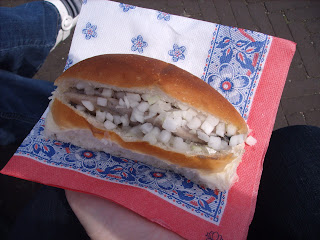How Does Culture Affect Food Choice?
My name is Emily Griffin
and I am originally from the small rainy town of Laurel, Oregon. I grew up on a hobby
farm in the Willamette Valley that provided nearly all our fruits and
vegetables as a family, as well as raising sheep, geese, rabbits, a pygmy goat,
multiple dogs, cats, rabbits, and a horse. I am a first generation American
from German parents, and through this blog I hope to share personal anecdotes
about my background as it relates to the study of Nutrition.
In particular, the
question of how our cultural background affects food choice greatly interests
me. I remember being sent to elementary school with a packed lunchbox every day
which included a German-influenced sandwich like ‘head cheese’ in aspic or
blood sausage on rye bread. Pickled or raw herring with onions was a favorite at the table,
and boiled potatoes with flaxseed featured in wintertime. These foods were
normal to me but elicited some raised eyebrows from friends.


Culture plays an enormous
role in the foods we choose to eat daily. “Cultural influences lead to the
difference in the habitual consumption of certain foods and in traditions of
preparation, and in certain cases can lead to restrictions such as exclusion of
meat and milk from the diet.” (“EUFIC: The Factors That Influence Our Food
Choices,” 2006). In fact, much of the time “food is cultural, not nutritional. A plant or
animal may be considered edible in one society and inedible in another.” (Reddy, Sreedhar, et al., 2015). Raw
herring is an acquired taste, to be sure.
Though most of my
parents’ Baltic food habits remained in their recipe vernacular over the decades
they spent in the United States, they did amend their diet in notable ways:
pork was rarely consumed, certainly far less than traditional meals would
include. Instead, much higher quantities of Pacific salmon featured on our
dinner table, as well as the Oregon staples of filberts (hazelnuts),
marionberries, blackberries, and pears. Adjusting the typical foods that my
family ate around the table is not a new phenomenon for an immigrant family.
The European Food Information Council notes that “cultural influences are …
amenable to change: when moving to a new country individuals often adopt particular
food habits of the local culture.” (“EUFIC: The Factors That Influence Our Food
Choices,” 2006).
I notice the keen impact
that culture has on individual food choice now that I am married. My husband is
from a French-Canadian family, and their table is usually filled with hearty meats,
potatoes, a sauce or gravy of some sort, and fresh fruits or vegetables only
when in season in the summertime. My personal intake of fish, vegetables, and
fruit was much higher growing up, not only due to accessibility, but because
these were conscious decisions reinforced by my parents. “Social support from
within the household … [is] positively associated with improvements in fruit
and vegetable consumption and with the preparative stage of improving eating
habits, respectively.” (“EUFIC: The Factors That Influence Our Food Choices,”
2006).
When purchasing groceries
for my family now, I tend to look through the aisles with a “what would my Mom
buy” mentality, a habit that reflects the idea that “[f]ood choice does not occur in a vacuum and people make
decisions based on their psycho-socio-cultural backgrounds, and they constantly
try to equilibrate among these factors, personal disposition, and what they
learn throughout their lifespan about food and eating practice from significant
and influential individuals including parents, family members, peers, friends,
partners, and couples.” (Roudsari et al, 2017). This buying practice might not
always work, and sometimes comes with guilt, but it directs me towards the healthy
foods that I grew up eating.
CITATIONS:
- “The Factors That Influence Our Food Choices.” The
Factors That Influence Our Food Choices: (EUFIC), 6 June 2006,
www.eufic.org/en/healthy-living/article/the-determinants-of-food-choice.
- Reddy, Sreedhar, et al. “Culture and Its Influence on
Nutrition and Oral Health.” Biomedical and Pharmacology Journal, 25 Oct.
2015,
biomedpharmajournal.org/vol8octoberspledition/culture-and-its-influence-on-nutrition-and-oral-health/.
- Haghighian Roudsari, Arezoo, et al.
“Psycho-Socio-Cultural Determinants of Food Choice: A Qualitative Study on
Adults in Social and Cultural Context of Iran.” Iranian Journal of
Psychiatry, Psychiatry & Psychology Research Center, Tehran University
of Medical Sciences, Oct. 2017, www.ncbi.nlm.nih.gov/pmc/articles/PMC5816913/.

Hey Emily! That was a very well written blog, and also interesting to read. I myself never really understood why certain foods we're frowned upon by different cultures. Eventually I became curious and started asking questions. That allowed me to have more of an open mind when it comes to cultural behavior around the world. I only wish other people would be me tolerant, and understandable.
ReplyDeleteHey Emily! Can I say I love how you design your blog. How it's also well written and sounds great. It's amazing how you are the first American German in your family. I bet there's a lot of food from your german side that tastes yummy. Your blog really opens my eyes to cultural foods and how it may be different from other cultures.
ReplyDeleteHello Emily, I found your post to very interesting. I never realized how different culture really impacted the things we ate. Now I'm starting to think culture also plays a role in the things we may or may not eat. Hopefully you continue to post more about German foods, because I can't help but think how good they taste. At first I was kind of scared away by the one food named "Blood sausage" , but it just simply motivated me to keep an open mind when experiencing foods from different cultures!
ReplyDelete-Tyrel Hill